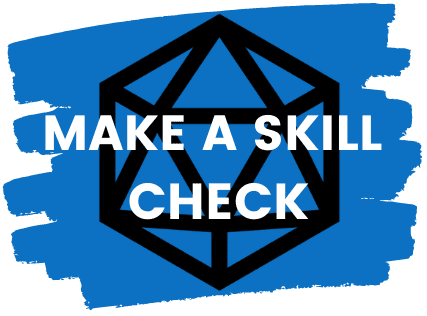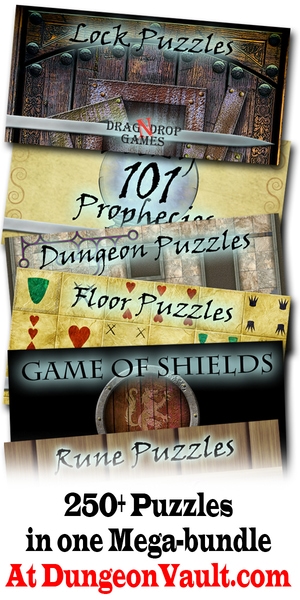When the party last was in Llowaya, it was a vibrant place, brimming with commerce and culture. My players had come to love it; their characters had gotten attached to certain NPCs and locations. They weren’t prepared to see it tattered, charred, and torn when they returned from their most recent trip, the people who livened its streets watching suspiciously from narrowly opened shutters.
After a tense exchange with the soldiers at the gates, the party immediately checked on NPCs they were worried about. Not to sell their haul from a ruin they explored or to restock potions, but to see if Aessun the blind seeress was ok, then living statue Kerdic the Ashen at the main bridge, and the artisan Auriin’Kehä after that. They would ask for news of other friends and acquaintances; for accounts of what had happened in the last few days. Great roleplaying all around.
So, let’s start by defining what roleplaying is:
Roleplaying is inhabiting a fictional world through a character, taking charge of their actions and expressing their personhood through action. D&D roleplay is a mix of freeform storytelling and mechanical gameplay (aka “rollplay”). Even freeform roleplay doesn’t necessarily equal acting.
Roleplay is also a source of anxiety for many new players, including Dungeon Masters (DMs). Understandably so: it’s very personal, and one might feel exposed or be afraid of ridicule when engaging with it, like stage fright. You’re performing for your group, after all.

A lot of it comes from the assumption that to “roleplay right,” you need to act everything out in the first person, do voices, and whatnot. This likely has to do with the popularity of actual play shows, chiefly Critical Role, where professional actors bring characters to life in the context of an RPG campaign.
This article is here to shove aside these unfair expectations and give you the tools you need to roleplay your way. Let’s get started.
Table of Contents
Character-Defining Questions and Backstory
Roleplay doesn’t happen in a vacuum. You’re trying to bring a particular character to life, so it helps to know who they are. When coming up with a character, you can build the foundations of great roleplay by answering some fundamental questions.
In D&D, three questions that you can answer right there in your character sheet and are encouraged to ponder when adding characters to your DM notes are:
- What are their bonds? A bond is something of great personal import to them, for which they are willing to make sacrifices: family, friends, country, religion, particular ambitions, the list goes on.
- What are their ideals? Ideals are beliefs the character lives by; living simply and sharing with the needy, doing no harm but taking no shit, bringing down the wicked, or rising above everyone else by great willpower and ingenuity – you get the drill. This can include aspirations, planting the seeds for character growth.
- What are their flaws or secrets? Things they hide because it shames them or for fear of adverse repercussions: a terrible thing they did to get where they are in life, a personality trait they dislike about themselves, a self-destructive tendency or habit, etc.
From these great starting points, you can derive the character’s wants, needs, and fears. You can come up with their backstory at any point in the process.
I like to start with a story and try to answer these questions as I write it; my editor (Phil) likes to come up with the above, then weave them together in a story. Do what works for you.
A good backstory includes relationships (NPCs for your DM to beat you with)! Bonus points if it includes other Player Characters (PCs). Having characters know each other and already have a dynamic when the campaign starts can make roleplay more comfortable.
You can even roleplay in private with whoever plays the character connected to yours, generating banter and shared memories to bring up at the gaming table (or over voice chat).
Naturally, as the campaign advances (more on this below), you can change the answers to some of these questions. Nothing changes a person more than the type of frantic, traumatic experiences D&D is full of.

You have probably noticed how I do not include alignment among my considerations.
I’m one of those people who think it’s a mostly obsolete legacy feature tied to the weird cosmology of most published D&D campaign settings.
There’s nothing alignment does for roleplay that bonds, ideals, and flaws don’t do better, and it might not come up if you’re not messing with the hells and such.
If you want to read more about it, we have an article about this very topic. Of course, you’re entitled to a contrary opinion and completely free to focus on your character’s alignment.
Roleplaying ≠ Acting
That’s right! You can roleplay to great effect without ever doing a voice or using body language. Many of the people I play with do terrific roleplay in the third person.
Ever heard of “show, don’t tell” for writing? Generally speaking, it’s more dramatic to have a character express themself through concrete action than speech. Have your character build things, help people, pursue spirituality, go on dates, spend money, rebuild temples, etc.
Let’s have a look at an example of roleplay through action:
The warlock Logarius (aka Crazy Logan) wanted to be a wizard in his youth but couldn’t, so he sought power elsewhere. Fast forward some years—into my campaign—and he took a level of wizard upon striking up a friendship with a most unorthodox teacher, for which his patron punished him.
This rattled him, but he kept it quiet.
When the party found a powerful item dedicated to a god, he saw a chance to regain the patron’s favor by altering the item to be dedicated to his patron. With a ritual the player devised between sessions, he secretly performed it while the others rested.
Instead of further defying the patron, Logarius sought to get back on its good side. Everybody at the game was invested in his story; everyone found the ritual riveting to witness, and the player accomplished most of this in the third person.
Now, mind you, the player does have a Logan voice and a song he usually listens to pre-game to get in the crazy Logan headspace, but these are just icing on top of a solid foundation of action.
Another character in that same game, the paladin Ólafur, has a lot of roleplay through art.
He hides subversive messaging in religious paintings and expresses himself through private art. He recently left a drawing at a shrine to the outlawed god of change, flux states, and solstice/equinox, which gave another character a hint about his past without them ever speaking of it.
Making sure the character’s actions are true to your vision and how you have portrayed them thus far is the meat of roleplay. You need zero acting chops to accomplish this, just a good working knowledge of who they are and where they want to go.
Dialogue
When you decide to use dialogue, remember that good dialogue is action because people use words to do all sorts of things.

- Some of these are external goals: challenge someone’s authority, hurt or heal someone’s feelings, extract information, etc. Pairing what you say in character—or what you tell everyone your character says—with social skill checks can greatly enhance social encounters.
- Some others are about internal changes of state. Dialogue can express a fear conquered, a stance taken, forgiveness of one’s past, renewed resolve, etc.
You can easily interpret some conversations as a series of verbal strikes, evasions, and parries (much like the fighting system in Griftlands or Disco Elysium). This goes for flirting, debating at a public event, interrogating someone, negotiating with a hag, etc.
In Summary
Don’t be afraid to flex some vocal skills or lack thereof.
My attempts at a Scottish accent somehow turn Metro 2033 Russian real quick, and my players love it.
On a more sober note, a little color goes a long way; speaking a bit softer, or higher pitched, or with a bit of twang, can help establish what a character sounds like.
Nothing fancy, and you can enhance it with recurring words that define the character. An example of this is Greg from Over the Garden Wall continually saying, “Ain’t that just the way.”
A Safe Space Helps
“Yeah, sure, I wanna do cool character things, but, even in the third person, I feel super anxious about taking the spotlight!” is something some of you might be thinking.
I don’t have an easy fix for this, but I have painfully shy friends who still shine at the game table. Their recommendation was:
“I can psych myself up to do things because I feel comfortable with our group.”
Most (though not all) of us are friends from high school, and we’re all each other’s D&D first group. Not everyone has that, and many of us would like to be able to play with new people on occasion, though.
A comfortable group is a group where you feel safe.
Safe can mean many things, so let’s assume basic human decency as a given and look at some specifics. My shy friends aren’t afraid of being judged for “suboptimal” decisions, ridiculed when something they say in character isn’t as cool out loud as it was in their head, or berated for slowing things down.
They know they have the freedom to experiment and even retcon some roleplay within reason.
It would be an issue to retcon a big decision whose consequences have already been reaped, but something they said in the previous section didn’t feel right in retrospect? Super doable.
It’s essential to take the game seriously by honoring everyone’s time investment, paying attention to what is said, and so on.

It’s also important not to take oneself and your fellow players too seriously. D&D is a game. We play games to have fun.
Sometimes the fun is crying over some heavy story event, but sometimes the rogue says “I kill fast and I move fast” to a prospective employer, and everyone loses it at the gratuitous edginess of the comment.
By the way, I’m the guy playing said rogue. I did that. We all have our moments.
For further info on fostering a safe gaming environment, I recommend our article on session 0s.
Note-taking for Roleplay
Note Taking can take almost every aspect of your D&D experience up a notch.
Good notes save time and enable big picture thinking. They also help us as players to keep track of what we’re trying to do with our characters and much more!
But how do we use notes specifically to enhance roleplay? That depends on what you’re going for, but here are some good practices:
- Keep track of people, places, organizations, items of note, and relevant information. This saves time and minimizes confusion when trying to recall things later.
- Recurring NPC? Write down what they do and your character’s relationship with them if it’s deeper than mere acquaintance or business.
- Major event? Write down how it affects your character.
These three points empower you to more fully inhabit the game world.
When at a loss, you may review your notes and generate plans that tie in with pre-existing content. It makes your roleplay more grounded and helps the DM.
Having information about the world at the tip of your tongue also enhances interactions with NPCs and may even affect your checks!
Roleplay to Enhance Rollplay
It pays to stack the deck when trying to get something out of someone with your words. That does not just mean “take a rogue dip for Expertise in the social stuff”.
If you noted a person of interest being vain, thus prone to believe in anything that casts them in a good light, you might find a way to weave flattery into your argument and get advantage—or a lower DC—on a check to persuade them.
Conversely, you may appeal to someone’s guilt over past deeds the party has uncovered to gain their help if you successfully present a path to atonement through helping you.
A good DM modifies the difficulty of a social check if the PC makes a clever point or appeals to the NPC’s sensibilities—bonds, flaws, ideals.
Though, it’s also good DMing to punish bad arguments and accidental insults with harder checks. This makes the Insight Skill even cooler and rewards note-taking.
I would go even further and untether a social check from Charisma depending on how the player portrayed it. There is already a rule (Player’s Handbook, pg 175) for using Strength instead of Charisma on intimidation checks based on a threat of violence. It’s not unprecedented.
For instance, if you play a scholarly type, you can ask your DM to let you make Persuasion checks using Intelligence if your character builds solid arguments about their field of study. Hell, even deception, as an expert is well equipped to dazzle the uninitiated with technical mumbo-jumbo.
Plan Ahead
Another great way to leverage note-taking for roleplay is by planning your beats!
If something happened during a session that affected your character deeply, return to your notes before the next time you play and write down the bones of a roleplaying moment you want to have.
Talk to your DM about making time for a scene, or to your fellow players about conversations your character wants to have with theirs.
Examples could be like crazy old Logan and his ritual; Ólafur making art; my gunslinger Öve taking time asking for help from his cleric friend to connect more with his spirituality in the lead up to a cleric dip, etc.
It works well for lighter roleplay, too. Playing an illiterate barbarian? Why not keep track of fancy words you can mispronounce to everyone’s amusement?
You can collect terrible puns to cast Hideous Laughter and insults for Vicious Mockery as well!
Summary
There, a general roadmap for unlocking your roleplaying potential, with or without acting chops! As usual, here’s the TL;DR:

- Roleplaying is inhabiting a fictional world through a character and expressing their personhood through action.
- Acting is a great tool for roleplay, but it’s not all there is and not the core of it.
- Show, don’t tell: concrete action expresses character better than speech. Your character can say they’re a good person, but if they don’t get out of their way to help anyone, that’s not what you’re playing.
- Pursue goals and whims, forge relationships with the world and its people, be rash when something important to you is at stake, the list goes on. What one does is who they are.
- Good dialogue is action—challenge, trick, persuade—or it can express internal processes the character is undergoing—a crisis of faith, guilt, triumph.
- A good way to determine character is by thinking about their bonds, ideals, and flaws. Their wants, needs, and fears. Their backstory has to (ahem) back it up. You can spare a thought for alignment, too, if that’s your jam, but I think it doesn’t matter.
- Taking the spotlight is scary. A safe play environment helps us come out of our shells and get to roleplaying. A safe space is, among other things, one where we can experiment and make mistakes free of judgment.
- The difficulty of a social check should react to what the PC says and does.
- Note-taking can be a huge roleplay asset. It helps with staying grounded in the fiction and enables planning ahead.







0 Comments